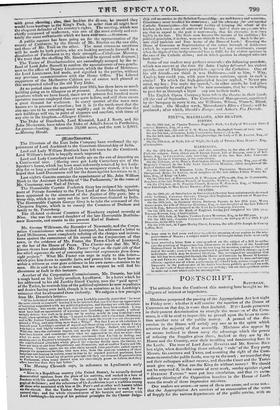Mr. Geor g e Wilkinson, the Recorder of Newcastle, and the Corpo-
ration Commissioner who visited Liverpool, has addressed a letter to Lord Melbourne, most completely refuting all the charges and insinua- tions against the correctness of his report on the Corporation of that town, in the evidence of Mr. Foster, the Town-Clerk of Liverpool, at the bar of the House of Peers. The Courier says that Mr. Wil. kinson shows how admirably Mr. Foster "kept on the right side of that line which separates the art of conveying incorrect expressions from down- right perjury." What Mr. Foster can urge in reply to this letter— which pins him down to specific facts, and proves him to have been as unfair a witness as ever gave evidence in his own cause—remains to be seen. He is said to be a clever man, but we suspect he will find his cleverness at fault in this instance. Another of the Corporation Commissioners, Mr. Dwarris, has laid a rough hand on his lordly assailant, Lyndhurst. In a letter which he has addressed to his old Jacobin friend Copley, now the "paid agent" of the Tories, be reminds him of the political opinions he now repudiates and denies having ever held, though it is as notorious as his Lordship's existence that he advocated them violently. We subjoin a few passages from Mr. Dvvarris's letter- - Or the individual who addresses yon, your Lordship correctly stated that ' he went the same circuit as yourself.' leaving it to be inferred that you had thus an opportunity of becoming acquainted with my political principles, and classing me with the calum- niated Whigs. But surely, my Lord, this advantage must base been mutual. 1, too. must have had an opportunity of knowing your Lordship; an-I the result, I unbesi tatingly delare, was such as to justify me in saying. nearly in your Lordship's own words, when speaking or Mr. Huge. • I appeal to the noble and learned lord t Denman), and to Mr Justice Vaughan, whether Mr. Copley upon the eircnit was not always con- sidered a Whig, and something more than a Whig?' Not that I am at all solicitous to impeach your Lordship's account of myself and those of my colleagues, whom I have long known and highly valued as sound and honest Whigs. Indeed. why shoal t I? 'What else does the statement import. but merely this—that our political principles have beea known and consistent—that what we appeared to be, that we were—that what we were, the same we have always continued—that Enalish in feeling. and exulting ever in England's triumphs, invariably attached to our limited monarchy and the constitutional principles which placed the reigning family upon the throne, we have not been at one time Republicans and Democrats, and at another Tories and Ob- strnetivel. Neither, again, are we, who claim no such brats pamitentrP. called upon to impugn the monstrous doctrine. that men who, from the uninom tendency of their language and hearing in society, come in time to be reputed political partisans, have and are to be held Lonnil by no public principle till they are returned Representatives to Parliament, when many Shrewd men are exceedingly prone to believe that they often have less than they had before."
The Morning Chronicle says, in reference to Lyndhurst's early bistory.—
" Born in a Republican country (the United States), he naturally derived democratical opinions from the place of his nativity, and sucked in a love of freedom with his mother's milk. On the circuit he was notoriously a dema- gogical declaimer ; and the vehemence of his Jacobinism is yet a tradition among ail those who associated with him at Dr. Parr's and at other well-known tables VD the circuit. But the Yankee Sergeant was too indolent to wait for his natural rise; and the whole circumstanees of his bargain and service with Lord Castlereagh—his swap of his political principles for the Chester Judge- ship and succession to the Solithel Generalship—are well-known and notorirms. Consistency never troubled his elmtrienee; and bin advocacy for and ergrastse Catholic Emancipation—his turwspit facility of bringing the wheel of the kitchen-jack round—are all matters of history. Incle.s1 there are per ions who say that an appeal to the past is unneees,ary, that his characte, is w itten legibly in his face. The Seals soon became the summit of his ambition ; his political principles, it is clear, were no obstacle to his ascent. Such is the pre. sent chief tactician and Tory leader of the House of Lords ! Entering she House of Commons as Representative of the rotten borough of Ashb num ( which he represented seven years), he never had any constituents, except when the bigots of ('alobridge returned hint in 1827, fin- ilia violent apostacv in the case of the Catholic claims; and on whiell question he changed sides 'and back again." Some of our readers may perhaps remember the following anecdote, which was current at the time Sir John Copley delivered his violent speech—one of Pbilpott's pamphlets—agailist the Catholics. One of his old friends—we think it was Hobbouse—said to him, " Why, Copley, how could you, with your known opinions, speak in such a strain ? To which the high-principled lawyer replied, " Never you mind, my boy; I've made my speech,"—in other words, he had given all the security he could give to ',is new associates, that he ■"'RS willing to pass for as thorough a bigot any one iii their ranks. The English Opera Company have taken the theatre in their hands till the end of September. The Corntnittee of Management, appointed by the 7oompany to carry it on, arc Williams, Wilson, Wrench, Bland, and Salter. On Mondny week, Mercadante's Riga e Claudia will be produced; after which, Ilmold's Zunqes und Auber's Fra Diaoolo.


























 Previous page
Previous page